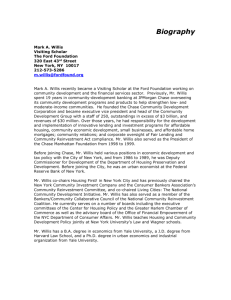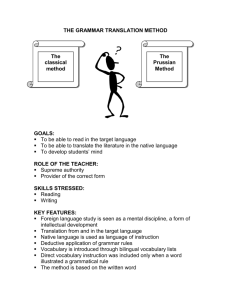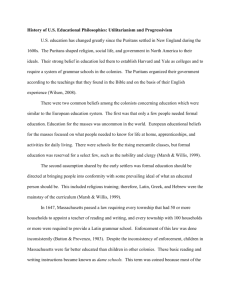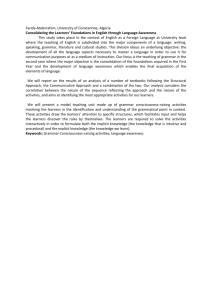200 most frequent words (types)
advertisement
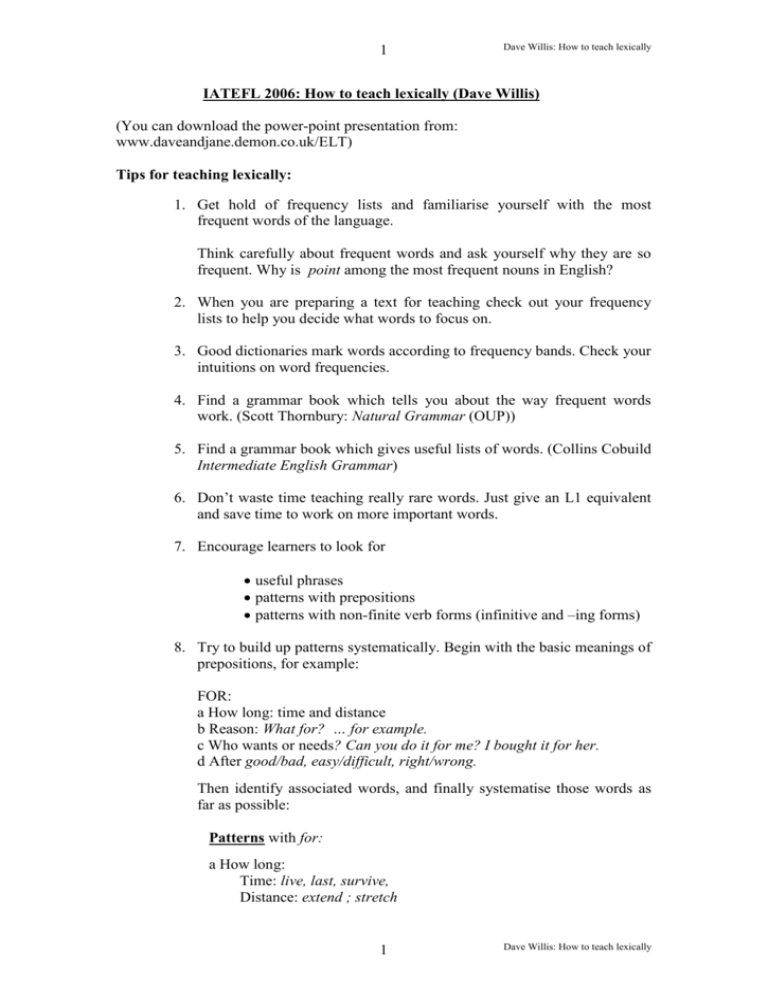
1 Dave Willis: How to teach lexically IATEFL 2006: How to teach lexically (Dave Willis) (You can download the power-point presentation from: www.daveandjane.demon.co.uk/ELT) Tips for teaching lexically: 1. Get hold of frequency lists and familiarise yourself with the most frequent words of the language. Think carefully about frequent words and ask yourself why they are so frequent. Why is point among the most frequent nouns in English? 2. When you are preparing a text for teaching check out your frequency lists to help you decide what words to focus on. 3. Good dictionaries mark words according to frequency bands. Check your intuitions on word frequencies. 4. Find a grammar book which tells you about the way frequent words work. (Scott Thornbury: Natural Grammar (OUP)) 5. Find a grammar book which gives useful lists of words. (Collins Cobuild Intermediate English Grammar) 6. Don’t waste time teaching really rare words. Just give an L1 equivalent and save time to work on more important words. 7. Encourage learners to look for useful phrases patterns with prepositions patterns with non-finite verb forms (infinitive and –ing forms) 8. Try to build up patterns systematically. Begin with the basic meanings of prepositions, for example: FOR: a How long: time and distance b Reason: What for? … for example. c Who wants or needs? Can you do it for me? I bought it for her. d After good/bad, easy/difficult, right/wrong. Then identify associated words, and finally systematise those words as far as possible: Patterns with for: a How long: Time: live, last, survive, Distance: extend ; stretch 1 Dave Willis: How to teach lexically 2 Dave Willis: How to teach lexically b Reason: ask; look; hunt; shop; wait; plan; arrange; prepare; apologise; pay. c Who wants or needs? work; play; act. d How much: buy; sell; pay. Finally, ask learners to identify familiar patterns as they occur in text. 9. Make learners aware of the importance of collocation. For example, draw attention to collocation in L1. 10. Set them exercises which make them think about collocation. Look at these collocations with strong. How many words would be needed to translate strong in you language? a strong personality; strong enough to; strong wind/current; strong impression/incentive/influence; strong opinions; strong words; strong action; strong language; a strong case against; a strong possibility; strong points; a strong team; a strong currency; strong drink; a strong colour; a strong taste. 11. When teaching pronunciation create examples incorporating common words and phrases rather than individual words. 12. Set dictionary exercises which make learners use dictionaries creatively. 13. Encourage learners to use dictionaries to check on patterns and collocation. 14. Encourage learners to keep a phrase book rather than a vocabulary book. 15. Encourage them to think about the organisation of their phrase books. 16. Encourage learners to do their own research and take responsibility for the language. 17. RECOGNISE THE IMPORTANCE OF RECALL IN LANGUAGE LEARNING. 2 Dave Willis: How to teach lexically 3 Dave Willis: How to teach lexically 200 most frequent words (types) the and to a of i it in you was 's is he for with that that on but they be have we at she yeah 's his not there this are had from what it's so know by said or if do as an all just were which er well has mm been up her would my can then who will about 've me don't think oh them their got when your him 're one out erm get no now as that's time could like go some very people right into two yes see 'm i'm 'll did really mean how because her going 'd one no good first than on say only any here other back down after more way last 3 its want also more in new come i've year years should you're didn't something our there's as these three being make still take put cos where day things over he's never too made went thing us thought again those mr all off why can't of quite even many through actually might world much they're man look life another own like out like when used night old same always i'll at a next came about you've over doing week must says may house Dave Willis: How to teach lexically 4 Dave Willis: How to teach lexically 50 most frequent nouns (headwords) 1. time 2. people 3. way 4. year 5. day 6. thing 7. world 8. man 9. life 10. night 11. 12. 13. 14. 15. 16. 17. 18. 19. 20. week house lot sort place end work children side money 21. home 22. family 23. part 24. city 25. school 26. number 27. room 28. head 29. point 30. kind 31. bit 32. women 33. road 34. government 35. country 36. name 37. hand 38. police 39. fact 40. mother 41. job 42. group 43. months 44. car 45. moment 46. street 47. town 48. door 49. problem 50. street 50 most frequent verbs (headwords) 1. 2. 3. 4. 5. 6. 7. 8. 9. 10. be have know say do would will think get could 11. go 12. see 13. mean 14. want 15. come 16. should 17. make 18. take 19. put 20. might 21. like 22. use 23. must 24. may 25. tell 26. give 27. need 28. find 29. let 30. leave 31. feel 32. call 33. keep 34. look 35. remember 36. ask 37. set 38. read 39. work 40. try 41. help 42. give 43. play 44. believe 45. turn 46. start 47. hear 48. talk 49. add 50. lose 50 most frequent adjectives (headwords) 1. good 2. other 3. new 4. old 5. right 6. great 7. little 8. big 9. different 10. best 11. long 12. sure 13. nice 14. young 15. small 16. only 17. high 18. bad 19. real 20. full 21. able 22. national 23. whole 24. important 25. free 26. local 27. sorry 28. open 29. main 30. hard 4 31. fine 32. wrong 33. happy 34. black 35. difficult 36. large 37. possible 38. early 39. white 40. true 41. top 42. available 43. short 44. certain 45. likely 46. poor 47. lovely 48. easy 49. clear 50. late Dave Willis: How to teach lexically 5 Dave Willis: How to teach lexically Most frequent 102 4grams (English spoken corpus) 1. 2. 3. 4. 5. 6. 7. 8. 9. 10. 11. 12. 13. 14. 15. 16. 17. 18. 19. 20. 21. 22. 23. 24. 25. 26. 27. 28. 29. 30. 31. 32. 33. 34. it 's it 's i think it 's i mean it 's you 've got to you know it 's you know what know what i mean i 'm going to i think that 's that 's what i at the end of the end of the i 've got a i don't know what that 's that 's you 've got a a bit of a it 's a bit i 've got to do you want to i think it was a lot of people i 'm i 'm it 's all right i don't know if you 're going to thank you very much we 're going to or something like that i 'm not sure i 'd like to do you know what and things like that i don't think i 35. 36. 37. 38. 39. 40. 41. 42. 43. 44. 45. 46. 47. 48. 49. 50. 51. 52. 53. 54. 55. 56. 57. 58. 59. 60. 61. 62. 63. 64. 65. 66. 67. 68. i don't know whether if you 've got i don't think it it 's not a that sort of thing that 's all right i mean that 's i don't want to 's going to be you know i mean i don't know how what do you think he 's he 's there 's a lot i was going to if you want to i mean i i it 's going to i 'll have to i thought it was i mean you know we 've got a 's a lot of a lot of the and i think that at the same time it 's just a to be able to well i don't know that 's why i it was it was you 've got the but it 's not i mean i 'm 5 69. quite a lot of 70. end of the day 71. i 've i 've 72. i mean i 've 73. in the middle of 74. i mean i don't 75. no it 's not 76. they 're they 're 77. you don't have to 78. it 's gonna be 79. we 've got to 80. i 'll tell you 81. i 'll i 'll 82. i don't think so 83. i think i think 84. i mean there 's 85. are you going to 86. to go to the 87. they 're going to 88. you 'll have to 89. have a look at 90. i mean i think 91. i mean if you 92. there 's there 's 93. it 's a very 94. but i don't know 95. you want me to 96. i 'm not going 97. if you if you 98. it 's a good 99. they 've got a 100. think it 's a 101. you know if you 102. a lot of money Dave Willis: How to teach lexically 6 Dave Willis: How to teach lexically The boy who came out from the cold. A schoolboy who spent the night trapped in a butcher's cold store after being locked in accidentally, ran on the spot for ten hours to stay alive. Peter Emerson, aged 15, was locked in the store in a Stratford-upon Avon butcher's shop for 14 hours with the temperature around freezing point. Staff arriving for work at the Wood Street shop found him yesterday morning with his teeth chattering and his face purple with cold. Still freezing, Peter immediately telephoned his parents, who had reported him missing to the police. Peter, who lives in Banbury Road, Stratford, said: "I help out at the shop after school and I had gone into the cold store just before closing time. I was behind a big food shelf when the door locked behind me. "At first I thought it was someone playing a joke but when I realised it wasn't and began shouting all the staff had gone home. I tried to kick the door open and to pick the lock but it was no good. References: Cambridge Advanced Learner’s Dictionary 2005 (Second Edition) CUP) Hunston, S. and G. Francis 2003 Pattern Grammar: a Corpus-driven Approach to the Lexical Grammar of English John Benjamins. Francis, G., S. Hunston and E. Manning 1996 Grammar Patterns 1: Verbs 1998: Grammar Patterns 2: Nouns and Adjectives. Collins Cobuild. Krishnamurthy, R. and D. Willis 2004 Intermediate English Grammar. Collins Cobuild. Thornbury S. 2004 Natural Grammar: The Keywords of English and How they Work. OUP. Willis, D. 2003 Rules, Patterns and Words: Grammar and Lexis in English Language Teaching. CUP Willis, D. and J. Wright 2003 Elementary English Grammar (Second edition) Collins Cobuild. 6 Dave Willis: How to teach lexically
